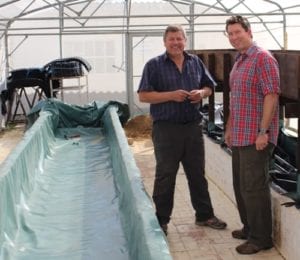Experts in aquaculture and agronomics of Stellenbosch University (SU) have joined forces with the mining company, Richmond Mining and Exploration, in a research project to discover the best aquaponics techniques to adopt when fish are farmed together with plants or vegetables. A successful outcome of this project is expected to be a large-scale commercialisation of the processes that are developed.
Richmond Mining and Exploration is funding among others a new aquaponics system which will be used in the following year for experiments by staff and postgraduate students of the SU Division of Aquaculture and the Department of Agronomics in the Faculty of AgriSciences. A team from Richmond, under the leadership of executive director Martiens van der Merwe, have been hard at work since the beginning of August at the Welgevallen Experimental Farm to install the necessary infrastructure. In aquaponics the principles of hydroponics and aquaculture are integrated to raise fish and plants together in separate units. The aim is that the plants, which include anything from lettuce and water lilies to tomatoes, should gain most of their nutrients from the water which circulates out of the fish ponds. According to Mr Henk Stander of the SU Division of Aquaculture, the prototype will be thoroughly tested during the following months, after which research can begin at the beginning of 2014 to test the success of different combinations of growing mediums, plants and fish.If all goes according to plan, the methods and combinations which eventually get the green light from the SU researchers will be implemented on a commercial scale by 2015 in the Dullstroom area.
Richmond Mining and Exploration started to take an interest in aquaponics after acquiring a farm in the Dullstroom area which is rich in kimberlite and on which 21 trout ponds are situated. According to Mr Martiens van der Merwe, managing director of Richmond Mining and Exploration, mining companies have a responsibility towards the surrounding communities to not only provide employment through their mining activities but also to ensure economic sustainability by setting up additional commercial options. “We hope to establish an aquaponics industry on the farm by which fish and vegetables can be raised,” he said. “Research into the proper techniques to use is therefore vitally important in order to ensure the success of the long-term project.”






